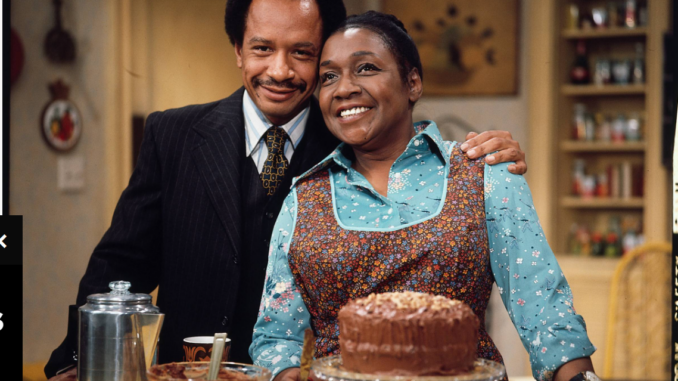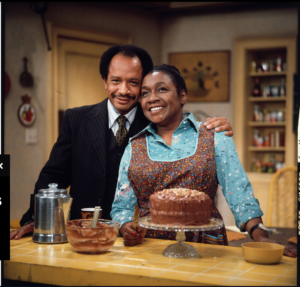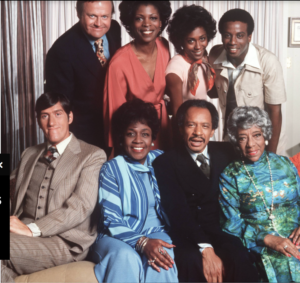
A spin-off of the widely successful ‘All In the Family’, ‘The Jeffersons’ ran for 11 seasons, compiling 253 episodes, and was a consistent top performer in the Nielsen ratings throughout its run.
The 1970’s was a golden era for Black sitcoms on network television. In the past, Black comedy on TV was reduced to buffoonery, stereotypical antics, and subservience to the ever-present white gaze. But the Black sitcoms that come of age during the 1970’s ushered in a new self-awareness that depicted the complexity and diversity of the African American experience. There were Norman Lear helmed sitcoms such as Sanford and Son, airing on NBC, starring Redd Foxx and Demond Wilson that centered upon the entrepreneurial endeavors of a father and son in the junk business in Watts. Good Times, created by Eric Monte and Mike Evans, starring Esther Rolle, John Amos, Jimmie Walker, Bern Nadette Stanis, Ralph Carter, and Ja’net Du Bois focused on the struggles of the working poor in the projects of Chicago. What’s Happening!, another Eric Monte creation based on the film Cooley High that he also penned, highlighted the ups and downs of teenage life of three high-school friends in Los Angeles played by Ernest Thomas, Fred Berry, and Haywood Nelson. Even Black sitcoms that had short shelf lives like That’s My Mama, and Baby I’m Back, presented an alternative narrative about familial relationships that was lacking previously on television. But the crown jewel of Black sitcoms to emerge in the 70’s, I would argue, was The Jeffersons.
A spin-off of the widely successful All In the Family and airing on CBS, The Jeffersons ran for 11 seasons, compiling 253 episodes, and was a consistent top performer in the Nielsen ratings throughout its run. The show featured an affluent, upper-class Black family made up of Louise “Weezy” Jefferson, her husband George Jefferson (Played by Isabel Sanford and Sherman Hemsley), and their son Lionel Jefferson (Played by Mike Evans, co-creator of Good Times) who rose from the hood in Queens to a luxury, deluxe apartment on the East Side of Manhattan due to the success of George’s dry-cleaning business. Also, The Jefferson’s featured the first interracial couple in television history, (Helen and Tom Willis) played by Roxie Roker and Franklin Cover. Marla Gibbs (The only living cast member) who played Florence Johnston, the Jefferson’s maid, was originally only supposed to be a recurring character but parlayed her limited screen time into becoming a regular cast member for the duration of the series.

Although forced to undergo 15 different time-slot changes, which is unheard of for such a popular show, The Jeffersons remained a mainstay in Black pop culture and was a crossover success well into the 1980’s. It was during the eighth season of the show, that it became the first African-American sitcom since Sanford and Son to ascend into the top five in ratings. The Jeffersons would go on to receive 13 Emmy nominations, and in 1981, Isabel Sanford became only the second Black actress to win the award for Best Actress.
The Jeffersons were more than George’s uncompromising commitment to capitalism, Weezy’s subtle slapstick, Florence’s quick wit, or the greatest theme song in the history of television (co-written and performed by Ja’Net DuBois). The true genius of The Jeffersons cast was their ability to address controversial and provocative subject matter with the comedic dexterity. The Jeffersons pushed the envelope of what Black sitcoms could give voice too by tackling racism, divorce, alcoholism, adult literacy, gun control, and gender identity.
In episode 31 of season two entitled “Florence’s Problem,” Louise notices Florence’s strange behavior and draws the conclusion that Florence is contemplating suicide. After finding a suspicious letter written by Florence, George and Weezy managed to talk Florence out of committing the act. This episode is one the first times that a sitcom addressed the theme of suicide.
Edith “Edie” Stokes, born Eddie Stokes, in episode 3 of Season 4 of The Jeffersons titled “Once a Friend,” served in the Korean War with George and was also his bunkmate. Unbeknownst to George, Edie struggled with gender dysphoria, eventually got gender reassignment surgery, and transitioned into living life as a woman. Edie, played by Veronica Redd, was the first time a transgender person appeared on a sitcom.
Episode 17 of season 8, “A Case of Self-Defense,” when Lionel and Jenny’s home is burglarized, George purchases a gun behind Louise’s back, who had forbidden him to do so. George recognizes the error he’s made when his grand-daughter accidentally fires the gun, almost shooting herself.
With comedic courage, The Jeffersons approached controversial topics that proved that being Black in America was never a monolithic undertaking.

Amazingly, after 11 seasons of critical success, the show ended under a cloud of controversy as it was unceremoniously canceled. The cast was not informed until after the July 2, 1985, episode “Red Robins.” In a T.V. Land retrospective of the show, Isabel Sanford remarks that she heard about the shows cancellation through her cousin in New York who read it in a tabloid magazine and Sherman Hemsley learned of the news by reading it in the newspaper. Collectively, the cast has publicly stated that the cancellation with no proper finale was the ultimate disrespect by the network. Unlike its contemporaries Happy Days, Newhart, and The Mary Tyler Moore Show, The Jeffersons were never afforded a proper send-off that the cast and their fans rightfully deserved.
Often when the lists of best sitcoms are assembled, The Jeffersons is tragically overlooked. But with the recent broadcast of the Live In Front of a Studio Audience Norman Lear’s The Jeffersons on ABC, starring Jamie Foxx as George, Wanda Sykes as Weezy, Kerry Washington as Helen, and Will Ferrell as Tom, the iconic Black sitcom is back in the public consciousness and finally receiving the accolades for being a groundbreaking show. The re-runs that continue to air in syndication are still as hilarious and cutting edge as anything that is offered on T.V. and streaming services today. For their unapologetic and beautiful Blackness, the aspirational ethos of upward Black mobility, and the legacy of sitcom brilliance that has influenced every Black sitcom that has come after it, the time is overdue for us to acknowledge the genius of The Jeffersons.